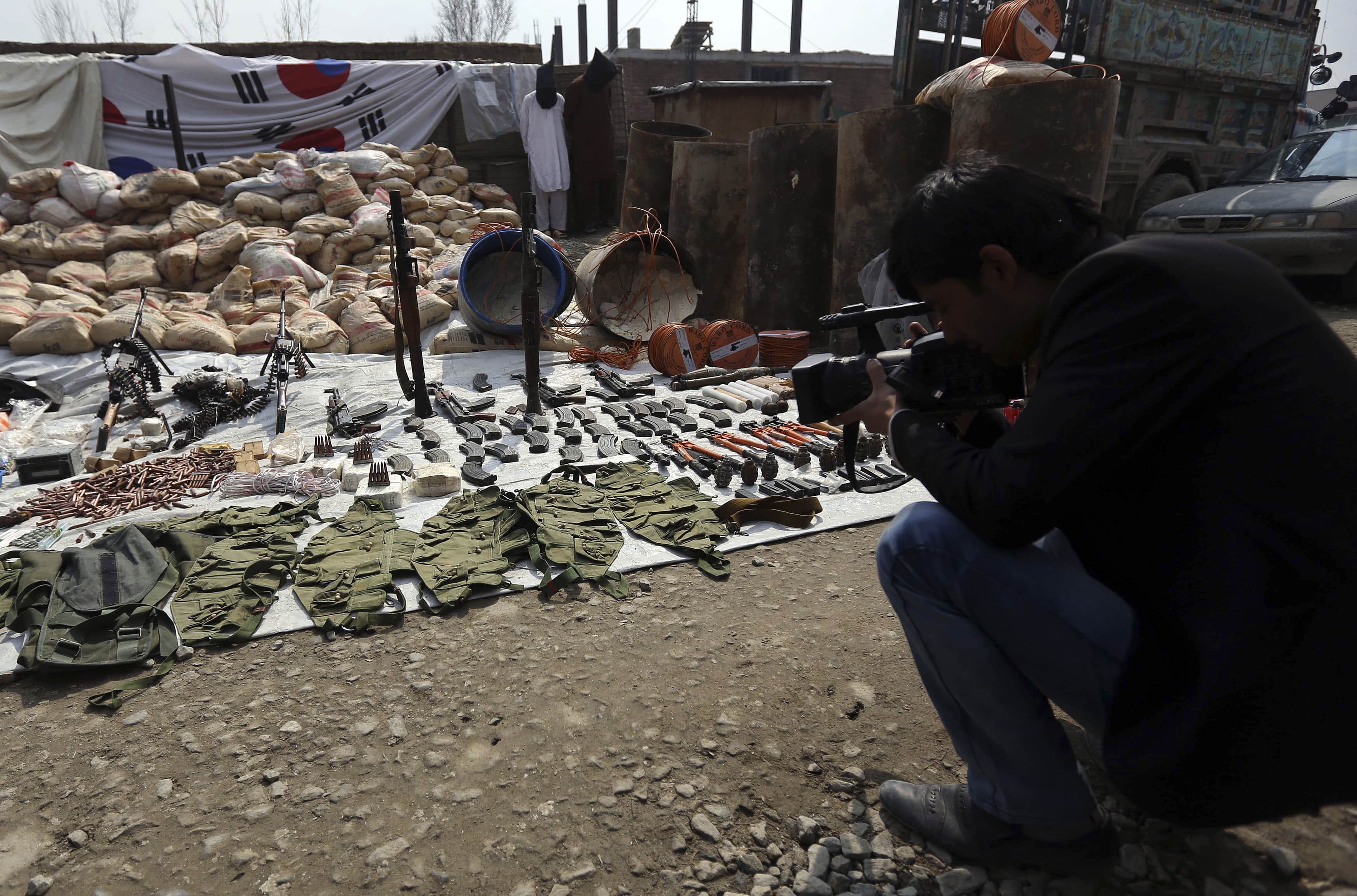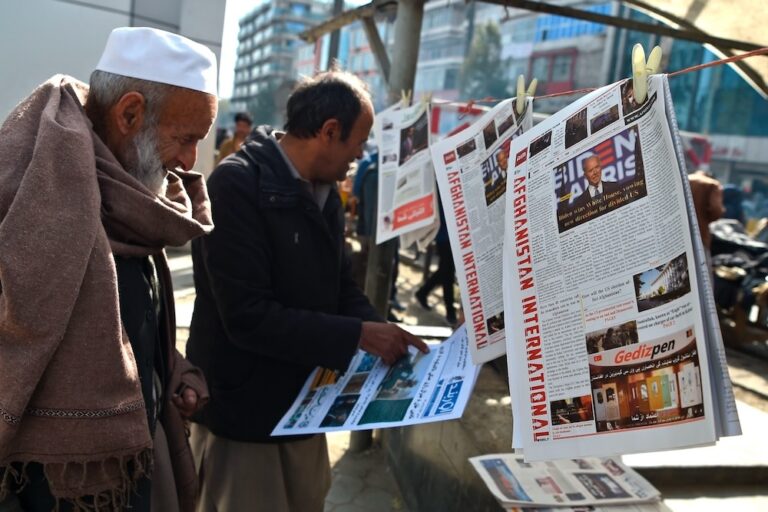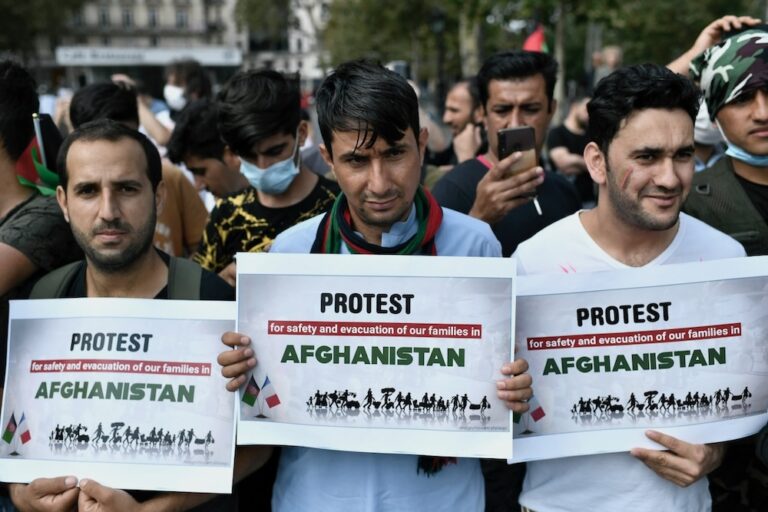The Afghanistan Journalists Center registered 84 media freedom violations during 2013 across the war-torn country, raising serious concerns about the safety of media representatives ahead of the April 2014 presidential vote and the international troops' pullout.
The Afghanistan Journalists Center (AFJC) registered 84 cases of violence against media freedom during 2013 across the war-torn country, raising serious concerns about the safety of media representatives ahead of the April 2014 presidential vote and the international troops’ pullout.
AFJC documented these cases which include incidents of murder, injuries, physical and verbal abuse, death threats and closure of media outlets from January to December 2013. Government officials and security forces, the Taliban and illegal armed groups were among the perpetrators of media violations.
These attacks violate the journalists’ right to life, undermine the public’s right to know and create an environment of self-censorship, especially in insecure southern and eastern provinces.
During this period, two cases of murder, four of injuries, four detentions, one conviction, the closure of two radio stations and an armed attack on another, as well as 72 incidents of threats, insult and beatings were reported.
In general, 18 cases involved governmental officials, 16 were perpetrated by unidentified individuals, 11 National Directorate of Security (intelligence) personnel, 11 Taliban, 9 policemen, 8 security guards, 6 irresponsible gunmen, 4 media outlet owners and 1 International Security Assistance Force (ISAF) soldiers.
AFJC’s findings show that violence against reporters is increasing amid fears that illegal armed groups will intensify attacks on the media in the future.
Besides the shrinking number of outlets, the sabotaging of the media law by the Ministry of Information and Culture, the unknown status of the draft Access to information law and the non-existence of a job and health insurance bill are among the serious problems faced by Afghan journalists.
The current Afghan Media Law was passed in 2002 and was revised following an increase in the number of media organizations. It was approved by the Afghan Parliament in 2007. The Media Law was revised for the third time in 2009 and was finally approved and published in 54 articles in the same year.
But since then the Minister of Information and Culture, Saiyed Makhdom Rahin, has failed to act on the implementation of the law. Due what his argument that the Law isn’t “proper” and needs further discussion, the minister has asked the parliament for amendments on article 42, 43 and 44.
These articles refer to the creation of a Media Commission – its main duties and authorities are to review requests for the establishment of new media, monitor the activities of mass media, review violations against the media, and budget review and monitor the National Radio TV’s finances, administration and broadcasting.
The law has been resent to parliament for amendments according to the recommendations of the information and culture minister, but no progress has so far been made in this regard.
The fate of the law on access to information is unknown and has yet to be sent to parliament for ratification.
Media representatives held several meetings with government officials and they reached an agreement regarding some of the differences they had. They also sent a draft in this regard to the cabinet, but so far it has not looked at the draft, nor sent it to parliament for approval.
Keeping in mind the upcoming elections, reporters are seriously in need of a law that safeguards access to information; in the meantime, if government sources continue to avoid sharing information with the media, there is recourse to punish them.
If the law is not ratified, the journalists will face serious problems ahead of the upcoming April poll and the withdrawal of international soldiers from Afghanistan.
Moreover, the cabinet has not approved the regulation about the employment of journalists, which also covers the rights of journalists and their employer.
Media personnel are being employed without work and health insurance. Owners of media outlets sometimes interfere in the professional activities of reporters, which is against the law, and they also irresponsibly fire the reporters whenever they want.
According to article 34 of the constitution, freedom of expression shall be inviolable. Every Afghan shall have the right to express her/his thoughts through speech, writing, illustrations, as well as other means in accordance with provisions of the constitution. Every Afghan shall have the right, according to provisions of law, to print and publish on subjects without prior submission to state authorities.
Directives related to the press, radio, and television as well as publications and other mass media shall be regulated by law.
Article 50 of the constitution insists that the citizens of Afghanistan shall have the right to access information from state departments in accordance with the provisions of the law. This right shall have no limit except when it may harm the rights of others as well as public security.
Meanwhile, most media outlets in Afghanistan have been reliant on foreign aid, and will be facing financial challenges after 2014 when there will be a shortage of international assistance.
While the culture of impunity has continued to thrive in 2013 and most of the cases of violations have not been investigated seriously, a positive development occurred at the end of the year. President Hamed Karzai then announced that all cases against media outlets which had been referred to the Attorney General Office (AGO) will be closed.
AFJC welcomes the decision, but at the same time is deeply concerned about the situation of media outlets, their future and the challenges and threats facing them. It calls on the Afghan government to step up efforts to strengthen media organizations, and protect freedom of speech as well as sustaining free media in the country.



